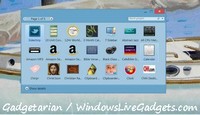Free Mercury eMail Server for SMTP, POP3, and IMAP accounts
Mercury is a free, working and reliable eMail Transport System. You will not find many programs like this, if you are after a free eMail server.
SMTP server module: This module is responsible for handling incoming mail delivery connections from the outside world. It accepts mail and places it in the core module’s mail queue for processing. MercuryS implements the Internet SMTP standard (Simple Mail Transfer Protocol) and supports several Extended SMTP extensions.
SMTP client module: MercuryC is responsible for sending mail to the outside world using the Internet SMTP mail protocol. MercuryC is what is known as a relay mailer – it does not attempt to deliver mail directly to the recipient; instead, it asks a larger SMTP implementation (often a unix host) to deliver it on its behalf. This relay model makes MercuryC particularly suitable for use behind firewalls, since it can ask the firewall system to send mail on its behalf.
SMTP direct delivery module: MercuryE is an alternative SMTP client module for Mercury; like the MercuryC module, it is responsible for sending mail from your system to the outside world. Unlike MercuryC, though, MercuryE can perform complete end-to-end delivery without requiring a relay host. MercuryE is typically used in situations where you have either a permanent Internet connection, or one with fast establishment, such as an ISDN connection. You can choose to install either MercuryC or MercuryE, depending on your needs, but you can only install one, not both.
POP3 server module: MercuryP listens for connections from POP3 client packages, such as and provides access to new mail waiting on the server via the POP3 protocol. MercuryP conforms to Internet Standards Document RFC1939, including support for advanced commands such as APOP and UIDL.
IMAP server module: MercuryI allows users running IMAP-capable mail programs such as Outlook to access entire mailboxes of folders remotely. Where the POP3 protocol only makes new mail available to the remote client, all of a user’s folders can be opened and manipulated using the IMAP protocol. IMAP is also a common way of providing WebMail services – many WebMail interfaces can connect to an IMAP server to provide their services.
